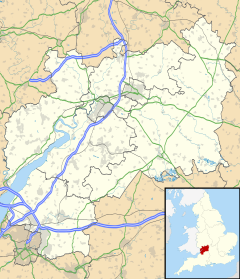Cinderford Ironworks
| Cinderford Ironworks | |
|---|---|

c1890. Cinderford Ironworks
|
|
|
|
|
| OS grid reference | SO651135129 |
| Coordinates | 51°48′49″N 2°30′31″W / 51.813727°N 2.508579°WCoordinates: 51°48′49″N 2°30′31″W / 51.813727°N 2.508579°W |
|
|
Cinderford Ironworks, also known as Cinderford Furnace, was a coke-fired blast furnace, built in 1795, just west of Cinderford, in the Forest of Dean, Gloucestershire, England.
The Forest of Dean, with its huge iron-ore reserves and ready supply of timber, had been an area of national importance in the production of iron, using charcoal, for hundreds of years. Even the name Cinderford is thought to have derived from the term 'sinders', meaning clinker, that was left behind by early Roman ironworks ('ford' probably refers to the crossing over the Cinderford Brook). The first coke-fired blast furnace was constructed in 1709 at Coalbrookdale, in Shropshire. However, despite there also being extensive coal measures in the Forest of Dean, local coal did not produce coke that was ideal for smelting and Forest ironmasters were reluctant to invest in the new technology. It was not until the last decade of the 18th century that coke-fired furnaces began to make an appearance, with Cinderford, Whitecliff and Parkend Ironworks being built almost simultaneously.
Work began on the ironworks in 1795; it was the first coke-fired blast furnace to be built in the Forest of Dean and probably came into blast in 1797, or possibly as late as 1798. It was built principally at the instigation of Thomas Teague, although it is unknown who the financial backers were. Coal was brought in by boat, along the Cinderford Canal from Broadmoor, just to the north. Iron-ore was brought in by mule, from Edge Hill and other mines.
It was working in 1806, but like Parkend Ironworks, probably ceased production around 1807. The reasons are not certain, but output had not reached 20 tons a week, which was exceptionally low. The difficulties may have been due to poor technical expertise, the unsuitability of the local coke, or perhaps both.
...
Wikipedia

